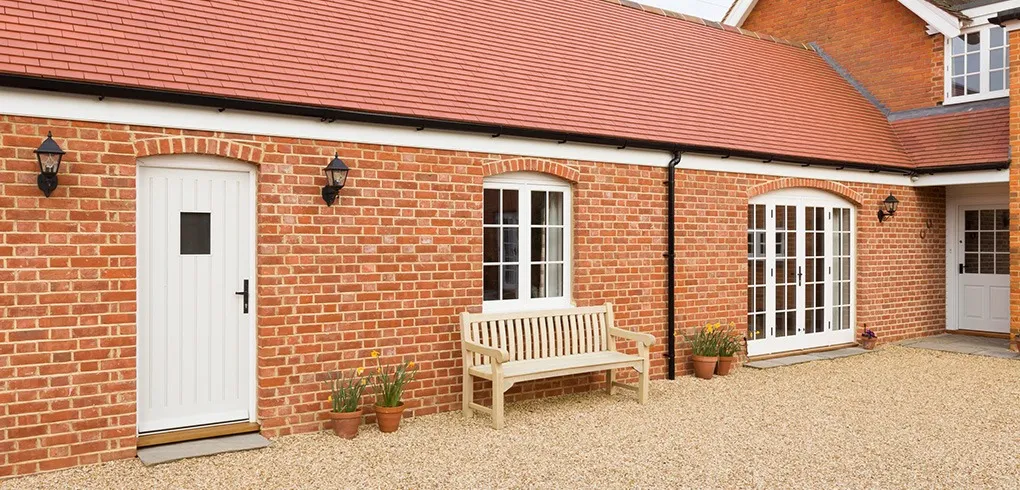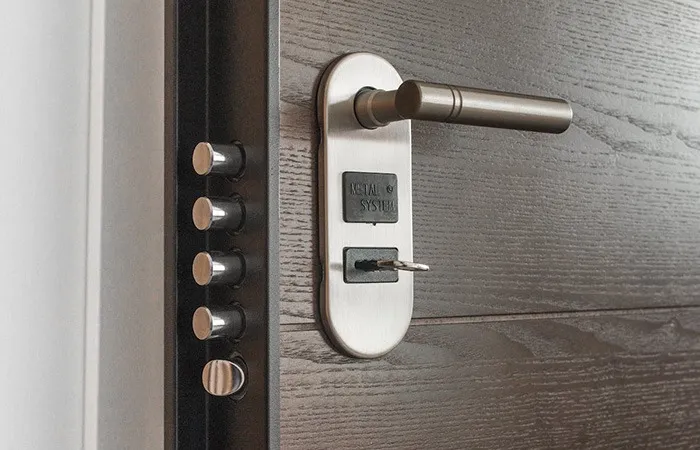Most lenders will consider properties with annexes, but whether they accept your application will depend on your intended use for the annexe. For less-common uses of annexes, you might still be able to get a mortgage through a specialist lender. For these cases, it can be very useful to have a broker like John Charcol, who can find you the best specialist lenders. The primary use for an annexe is having a member of the family live there. This is often called having a “granny annexe” and is the most common reason people buy homes with this feature. This will usually be covered by a standard residential mortgage, as long as the annexe meets other structural criteria. More complex cases might require different mortgages.

Mortgages for Properties with Annexes
Want to get a mortgage on a property with an annex? We’ll explain how to get a mortgage, the criteria and more.
speak to a mortgage advisor
Fill out this enquiry form and we’ll contact you to book a free call with one of our mortgage experts.
"*" indicates required fields
Buying a property with an annexe can be a great choice for people who need some extra space, whether as an extension on the side of the building or a stand-alone structure. Often, people want to purchase a house with an annexe to live with older relatives. An annexe can make sure that a relative is nearby for any care they need but also gives them privacy and freedom in a way that most other types of houses don’t.
Annexes can also be great if you need extra space for a business you run from home, or to always have a place for adult children to live if they need to. However, getting a mortgage for a property with an annexe can confusing.
If you’re wondering how to get a mortgage on a property with an annexe, this guide will tell you everything you need to know before applying for a mortgage.
Contents
Can I Get a Mortgage for a Property with an Annexe?
What Are the Criteria for Mortgages on Properties with Annexes?
For a standard residential annexe, you would get a mortgage that would be the same for almost any type of home. Most lenders will offer a mortgage on this type of annexe. The exact criteria will vary from lender to lender, but the general criteria will roughly be the same.
If you’re looking for a second home mortgage for a property with an annexe, expect a higher deposit amount requirement and extra criteria.
It’s worth remembering that buying a house with an annexe will likely be more expensive than simply buying a family home, so make sure that your income is high enough to afford it. As a general rule, most lenders will let you borrow around four times your income for the mortgage.
There are some common, additional criteria that you’ll find when for this type of property:
- Lodgers – no more than two lodgers at a time
- Lodger type – lodgers must be relatives of the owners, or staff employed by the owners if the property is bought with a residential mortgage
- Living arrangements – residents should all be living as family members, with shared access and areas
How Much Deposit Will I Need?
For most standard residential mortgages, you’ll need a minimum deposit of 10% of the property’s value, though some lenders may offer a 5% deposit mortgage. If you’re looking to buy a property as your second home, the deposit amount tends to be higher, usually starting at around 20%. It could also be higher if there are unusual factors to the house, such as non-standard construction, high-risk areas, or other special circumstances.
Can First Time Buyers Get a Mortgage for a House with an Annexe?
Yes, there’s nothing to stop first time buyers from getting a mortgage on a property with an annexe. The only consideration is that the house value will likely be higher than normal, which means you will need a higher income. For a first time buyer, mortgage lenders might want longer proof of a stable income before lending higher amounts.
Will I Need Special Insurance?
If you’re using the property as your primary residence, you should be able to have standard home insurance. Make sure to check with your mortgage lender what type of insurance is required in case there are additional requirements due to your exact property. If you have a non-standard construction house or if you want to use the property as a holiday home, you might need other insurance to adequately protect your property.
Is it Harder to Get a Mortgage If You’re Self-Employed?
It’s not harder to get a mortgage if you’re self-employed, you may need to just provide a few more bits of information to prove your affordability. You’ll need to have multiple years of accounts in order to prove a stable income. If you own your own business, a mortgage lender might also want to see financial information on your company. If you’re struggling to find a mortgage, John Charcol can help you find lenders who specialise in loans to self-employed borrowers.
What Features Does an Annexe Need?
There are a few things to consider when it comes to features of an annexe, as they could impact how easy it is to get a mortgage:
Security Concerns
If an annexe hasn’t been built with proper security in mind, this could be a concern. This could cause problems for insurance, as well as getting a mortgage.
Internal Doors
If the annexe is attached to the main property, some mortgage lenders will require there to be a functional internal door to connect the two, rather than it being fully self-contained.
Facilities and Layout
If the annexe features a studio layout, you might find that some mortgage lenders are less willing to take this on due to increased safety risks or marketability.
Size
Most annexes must be proportional in size to the main building to be covered by a mortgage lender.

Sharing an Annexed Property with a Relative
Since the most common reason to get a property with a granny annexe is to live with a relative, it’s worth looking at the ways that you can buy a property with your relatives.
Joint Tenants
If you’re buying the property with their relatives, this could be done as joint tenants. This could mean that both parties are on the mortgage, and both own equal shares in the property. This can be a very simple arrangement, and it can be useful for older relatives. If one of the people on the property deed dies, their shares are divided between the other owners, who will still be responsible for the mortgage.
Tenants in Common
Alternatively, multiple people could own the property together as tenants in common. This allows everyone to own the property together, but at different share percentages, giving them different mortgage amounts to pay off.
In this instance, if one of the people on the deed passes away, their portion of the property is passed on to their named beneficiary. This can be more complex to arrange, and it could even risk the other owners having to buy out the beneficiary if it’s not one of them. This can be avoided by making sure that all the people involved have their wills arranged carefully to avoid problems, but you cannot guarantee that someone won’t change their will and cause issues. Some mortgage lenders are unwilling to offer mortgages to tenants in common because it could cause them problems if they need to repossess the property.
Buying Alone
If you want to buy the property individually, without whoever will be living in the annexe, you could also choose to buy the property alone or with your partner. This can be a harder route to take due to affordability concerns.
Properties with annexes will be more valuable than a standard family home. This will usually mean that you need a higher income in order to buy the house. Mortgage providers will often also consider the relative to be a dependant if they aren’t contributing to the mortgage, meaning that your outgoings will, on paper at least, have more to cover. If you have the income to comfortably cover the mortgage, this can be the easiest type of mortgage for a property with an annexe extension.
Can I Buy a Property with a Retired Relative?
It can be hard to get a mortgage with a retired relative since their income will be low compared to the house price. There is also the risk that they could pass away during the mortgage term, which can make the issue of ownership more complex, as in the situation of tenancy in common above.
A lot of mortgage lenders will have a maximum age cap somewhere between 65 and 70. Specifically, this will usually be the maximum age at the end of the mortgage term. However, it’s not impossible to get a mortgage alongside a retired relative. A lot of lenders will have higher age caps, or potentially none, under certain circumstances. If you’re having trouble getting a mortgage with a retired relative, you can get expert help from one of our mortgage brokers, who have experience finding these types of mortgages.

Can I Rent Out My Annexe?
If you’re looking to rent out your annexe, either as a long-term rental or a holiday let, you may still be able to attain a standard residential mortgage.
However, some lenders may refuse your application if you plan to rent out. In this case, you might need a more complex mortgage type, such as a multipurpose mortgage. This could mean combining a buy-to-let or holiday let mortgage for the annexe, and a residential mortgage for the main home. Contact a specialist lender to support you through this route.
Some lenders may also take into consideration any potential rental income from the annexe, which could help boost your affordability. However, this is relatively rare and you should contact one of our brokers if you want a mortgage with this consideration. It’s also worth looking at the tax changes for buy-to-let properties, before purchasing a rental home.
Can I Run a Business from My Annexe?
Another common reason to want an annexe is to have a separate space for running a business. This has become more popular in recent years, and thankfully the process for getting mortgages for properties with annexes for business use is fairly simple. Most mortgage lenders will allow you to get a residential mortgage for this, as long as the annexe is small enough — usually, no more than 40% of the total property. For larger annexes, you might need a specialist lender if you intend to use the annexe for business.
What If I Want to Build an Annexe on My Existing House?
If you would rather construct an annexe on your existing house, or purchase a house and build an annexe on it, you can look at other types of mortgages and lending, such as:
Remortgaging
You could choose to remortgage your home if you’re looking to build an annexe on your current property. This can be a simple way to go about getting the finances you need.
Personal Loans
If you only need a relatively small amount of money to build your desired annexe, you could look at personal loans. These typically are limited to £50,000.
What Annexes Might Not be Covered by Mortgages?
There are some buildings with annexes where it can be very hard to get a mortgage. This includes:
Oversized Annexes
If the annexe is disproportionately sized, or larger than, the main building, you might struggle to get approved for a mortgage.
Non-Standard Construction
Buildings with unusual construction methods are considered high-risk by many lenders. This is because they could lose too much value if they have to recoup their losses in the event of a repossession. Specialist lenders have products available that are tailored to these property types. It’s a good idea to get a structural survey before applying for a mortgage to check for any problems that could prevent you from getting funding.
An Improperly Built Annexe
If the annexe has not been properly built, this could seriously impact marketability and whether you can get home insurance. This means that mortgage lenders will almost certainly not offer a loan.
If you’re trying to get a mortgage for a difficult property, a member of our team can help you find the appropriate specialist lenders.
Mortgage for a Property with Annexe - The Bottom Line
An annexe property mortgage is typically the same as a residential mortgage, as long as you’re planning to use it for only residential purposes. If it will be your primary home, it’s very possible to get a mortgage with a 10% deposit, at standard interest rates. If you’re buying the property as a holiday home, you can expect similar terms to any holiday home mortgage.
Depending on its intended use, it can be tricky to get a mortgage on a property with an annexe. If you intend to let out the annexe, this can mean higher interest rates on a potential mortgage. Construction type and annexe size could also mean that you need to get in touch with our specialist mortgage brokers. Take a look at our house buying guide for more information.
If you’re looking for a mortgage on a property with an annexe, get in touch today to see how we can help. Here at John Charcol, we have brokers with plenty of experience in specialist mortgage types, meaning we can help you get an ideal mortgage for your property.
